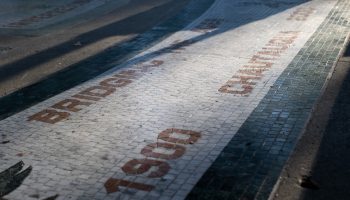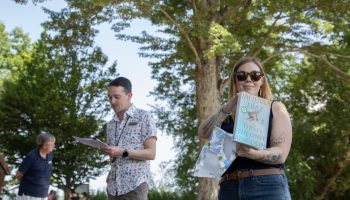
Chautauqua Opera Conservatory students will perform at 6:30 p.m. tonight in Fletcher Music Hall for the performance “2025 Scenes Program with Kensho Watanabe.” It will be the students’ final Wednesday evening recital before their six-week season concludes with a Sing-Out on Friday. With selections from La Traviata, Street Scene, Die Zauberflöte and many more, the recital will showcase a wide variety of operatic styles.
Watanabe is an internationally acclaimed conductor and accomplished violinist. He was the inaugural conducting fellow of the Curtis Institute of Music and student of Yannick Nézet-Séguin and Otto-Werner Mueller. He made his debut at the Metropolitan Opera conducting Kevin Puts’ The Hours and returned this past season for Puccini’s La Bohème.
“I really like splitting time between opera and symphonic (music),” Watanabe said. “I think the work that I do in opera informs the work that I do in symphonic and vice versa.”
The program tonight encompasses scenes from bel canto with Rossini’s Il Barbiere di Siviglia and Donizetti’s Lucia di Lammermoor; baroque with Handel’s Alcina; verismo with Puccini’s Madama Butterfly; and Weill’s genre-blending Street Scene.
“Something I think is really interesting about the program is that it spans a very wide range of styles,” Watanabe said. “In terms of someone that is interested in coming to this concert, you get a wide range of operatic scenes, and you can get a sense of how opera has changed over the years as well, so I think it’s quite interesting.”
The varied program is not only appealing for the audience, but for Watanabe as well.
“There are operatic styles that I’ve done a lot of — which is Puccini, Italian repertoire and contemporary opera — and I haven’t done much French opera or German language opera, so it’s also a great opportunity for me to start to get excited about that side of the repertoire as well,” he said.
Shedding light on his approach to operatic conducting, Watanabe shared how he collaborates with opera singers.
“I think that my added value as a conductor is really to connect the singers with the orchestra, knowing what instrumentation is there, (and) also perhaps harmonically,” Watanabe said. “… I also want to give some insight into how I see the music through the conductor’s perspective, which usually means with the perspective of the full score.”
Although this evening’s recital does not have an orchestra, a conductor’s knowledge of the operatic score can be invaluable.
“If there is something that is quite emotionally charged, I find that the orchestra is just as much a character in an opera (as) the characters themselves, so giving them insight into how I see the role of the orchestra and how best to collaborate with that orchestra is probably what I would like to impart on these singers as I work with them this week,” he said.
Watanabe is particularly excited to be working with the Opera Conservatory students.
“Any time you get to work with young, enthusiastic and emerging singers is really exciting,” Watanabe said. “I think there’s a certain energy that young artists bring sometimes — their fresh perspectives, their willingness to try different things that you might not necessarily get with more experienced singers — and so it’s really exciting to be able to collaborate with really great, young talent like they have at Chautauqua.”




